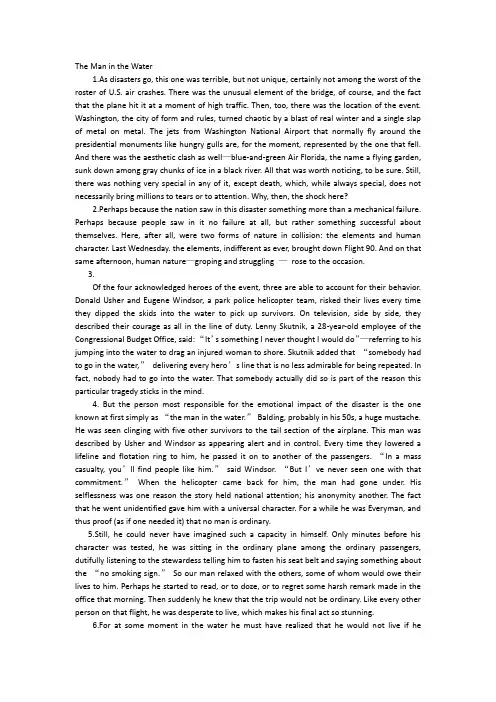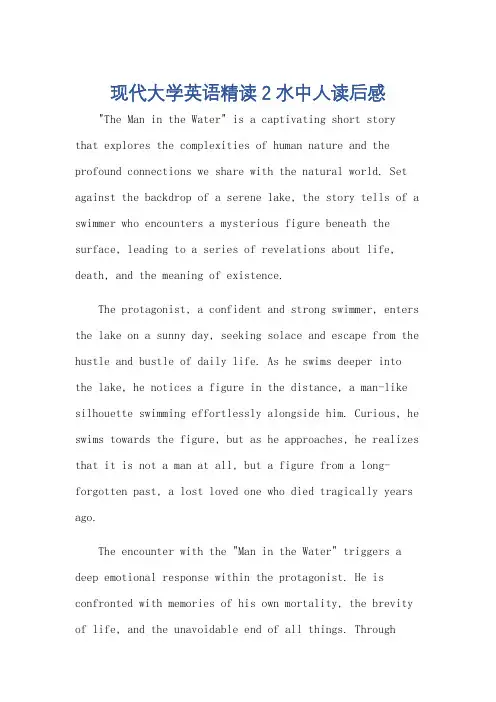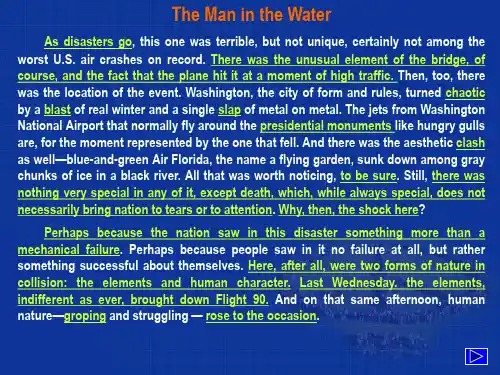The Man in the Water.题目翻译杂谈doc
the man in the water课文原文带段落

The Man in the Water1.As disasters go, this one was terrible, but not unique, certainly not among the worst of the roster of U.S. air crashes. There was the unusual element of the bridge, of course, and the fact that the plane hit it at a moment of high traffic. Then, too, there was the location of the event. Washington, the city of form and rules, turned chaotic by a blast of real winter and a single slap of metal on metal. The jets from Washington National Airport that normally fly around the presidential monuments like hungry gulls are, for the moment, represented by the one that fell. And there was the aesthetic clash as well—blue-and-green Air Florida, the name a flying garden, sunk down among gray chunks of ice in a black river. All that was worth noticing, to be sure. Still, there was nothing very special in any of it, except death, which, while always special, does not necessarily bring millions to tears or to attention. Why, then, the shock here?2.Perhaps because the nation saw in this disaster something more than a mechanical failure. Perhaps because people saw in it no failure at all, but rather something successful about themselves. Here, after all, were two forms of nature in collision: the elements and human character. Last Wednesday. the elements, indifferent as ever, brought down Flight 90. And on that same afternoon, human nature—groping and struggling —rose to the occasion.3.Of the four acknowledged heroes of the event, three are able to account for their behavior. Donald Usher and Eugene Windsor, a park police helicopter team, risked their lives every time they dipped the skids into the water to pick up survivors. On television, side by side, they described their courage as all in the line of duty. Lenny Skutnik, a 28-year-old employee of the Congressional Budget Office, said: “It’s something I never thought I would do”—referring to his jumping into the water to drag an injured woman to shore. Skutnik added that “somebody had to go in the water,”delivering every hero’s line that is no less admirable for being repeated. In fact, nobody had to go into the water. That somebody actually did so is part of the reason this particular tragedy sticks in the mind.4. But the person most responsible for the emotional impact of the disaster is the one known at first simply as “the man in the water.”Balding, probably in his 50s, a huge mustache. He was seen clinging with five other survivors to the tail section of the airplane. This man was described by Usher and Windsor as appearing alert and in control. Every time they lowered a lifeline and flotation ring to him, he passed it on to another of the passengers. “In a mass casualty, you’ll find people like him.”said Windsor. “But I’ve never seen one with that commitment.”When the helicopter came back for him, the man had gone under. His selflessness was one reason the story held national attention; his anonymity another. The fact that he went unidentified gave him with a universal character. For a while he was Everyman, and thus proof (as if one needed it) that no man is ordinary.5.Still, he could never have imagined such a capacity in himself. Only minutes before his character was tested, he was sitting in the ordinary plane among the ordinary passengers, dutifully listening to the stewardess telling him to fasten his seat belt and saying something about the “no smoking sign.”So our man relaxed with the others, some of whom would owe their lives to him. Perhaps he started to read, or to doze, or to regret some harsh remark made in the office that morning. Then suddenly he knew that the trip would not be ordinary. Like every other person on that flight, he was desperate to live, which makes his final act so stunning.6.For at some moment in the water he must have realized that he would not live if hecontinued to hand over the rope and ring to others. He had to know it, no matter how gradual the effect of the cold. He felt he had no choice. When the helicopter took off with what was to be the last survivor, he watched everything in the world move away from him, and he let it happen.7.Yet there was something else about our man that kept our thoughts on him, and which keeps our thoughts on him still. He was there, in the essential, classic circumstance. Man in nature. The man in the water. For its part, nature cared nothing about the five passengers. Our man, on the other hand, cared totally. So age-old battle began again in the Potomac. For as long as that man could last, they went at each other, nature and man; the one making no distinctions of good and evil, acting on no principles, offering no lifelines; the other acting wholly on distinctions, principles and, perhaps, on faith.8.Since it was he who lost the fight, we ought to come again to the conclusion that people are powerless in the world. In reality, we believe the opposite, and it takes the act of the man in the water to remind us of our true feelings in this matter. It is not to say that everyone would have acted as he did, or as Usher, Windsor and Skutnik. Yet whatever moved these men to challenge death on behalf of their fellows is not peculiar to them. Everyone feels the possibility in himself. That is the enduring wonder of the story. That is why we would not let go of it. If the man in the water gave a lifeline to the people gasping for survival, he was likewise giving a lifeline to those who watched him.9.The odd thing is that we do not even really believe that the man in the water lost his fight. “Everything in Nature contains all the powers of Nature.”said Emerson. Exactly. The man In the water had his own natural powers. He could not make ice storms, or freeze the water until it froze the blood. But he could hand life over to a stranger, and that is a power of nature too. The man in the water set himself against an immovable, impersonal enemy; he fought it with kindness and he held it to a standoff. He was the best we can do.。
The Man in the Water译文教学提纲

T h e M a n i n t h e W a t e r译文The Man in the Water (课文翻译)跟人类所经历的其他灾难相比,这次算得上是相当严重,但并不是史无前例的,确切的说,算不上美国历史上最严重的空难。
当然,这次灾难也有与众不同的地方。
例如,事故发生在桥上,肇事飞机在交通高峰期撞到桥上。
还有就是事故发生的地点与众不同。
华盛顿这个秩序井然的城市,因为隆冬的匆匆到来和这次事故变得人心惶惶。
事故发生时,华盛顿国家机场的飞机跟往常一样像饥饿的鸽子般在总统纪念碑上空盘旋,坠落的那架就成了它们的象征。
紧接着,那架蓝绿相间有空中花园之称的佛罗里达客机轰得坠落,在冰块中消失的无影无踪,虽然这样,姿势却仍优雅万分。
可以肯定地说,这些都是值得注意的。
然而除了死亡人数之外,这次事故再没有什么与众不同的地方。
死亡总是特别的,但未必总会引起千百万人的瞩目。
那么震惊之处何在呢?也许在这场灾难中,人们看到的不仅仅是机械故障,或许他们就根本没有看到故障,而是发现了自己的某些成功之处。
毕竟,这是两种力量的碰撞:自然力量和人的性格。
大自然的力量总是如此无情,上周三硬是让90次航班坠落。
也正是在那天下午,人的品质——在摸索与挣扎中——奋起反抗,应对灾难。
在这次事件中,有四个公认的英雄,其中三个有幸活下来解释他们的英勇行为。
唐纳德厄舍和尤金温沙是公园巡警直升机的队员,他们两人一次次冒着生命危险把起落架放进水中去搭救幸存者。
在电视上,他们俩并排站着,把自己的所作所为说成是分内之事。
28岁的斯库尼克是国会预算办公室职员,他说:“我从未想过自己会那样做”——指他跳下水去把一个受伤的妇女拖上岸的事迹,他又接着说:“总得有人跳下水。
”这句话成为众多英雄的口头禅,虽无新意却仍令人钦佩。
事实上,并没有谁非下水不可,但有人却真的这样做了,这也是之所以悲剧的阴霾在人们心中久久不能散去的原因。
这次灾难中最最牵动千万人心弦的当属那个起初被称为“水中人”的英雄,他秃顶,大约五十多岁的年纪。
themaninthewater主旨大意

themaninthewater主旨大意
摘要:
1.故事背景及主人公介绍
2.主人公落水后的自救尝试
3.主人公与救援队伍的互动
4.救援过程中的困难与挑战
5.主人公获救后的反思与感悟
6.故事对读者的启示
正文:
【故事背景及主人公介绍】
在一个平静的日子里,主人公,一位年轻的游泳爱好者,决定到湖里游泳。
然而,在他享受着游泳的乐趣时,突然一阵强风刮过,将他吹离了湖岸,推向了深水区。
【主人公落水后的自救尝试】
面对这突如其来的困境,主人公并未惊慌失措,他迅速冷静下来,试图通过划水、踢腿等方式游回湖岸。
然而,由于风力和水流的干扰,他发现自己离岸边越来越远。
【主人公与救援队伍的互动】
在意识到自己的力量不足以自救后,主人公开始大声呼救。
幸运的是,附近的一位游客发现了他的困境,立即通知了救援队伍。
救援队伍迅速展开了搜救行动,使用各种工具和设备寻找主人公。
【救援过程中的困难与挑战】
然而,救援过程并非一帆风顺。
由于主人公落水的地方水深较深,救援队伍的船只无法靠近。
此外,主人公所处的位置也使得救援直升机难以找到他。
这使得救援行动陷入了僵局。
【主人公获救后的反思与感悟】
在经历了漫长的等待后,救援队伍终于找到了主人公,并成功将他救上了岸。
这次经历让主人公深刻地意识到了自然的力量以及生命的可贵。
他开始重新审视自己的生活,并决定投身于救援事业,以帮助更多的人。
【故事对读者的启示】
这个故事告诉我们,面对困境时,保持冷静和自信至关重要。
同时,我们也要珍惜生命,尊重自然,并学会在危难时刻互相帮助。
现代大学英语精读2水中人读后感

现代大学英语精读2水中人读后感"The Man in the Water" is a captivating short storythat explores the complexities of human nature and the profound connections we share with the natural world. Set against the backdrop of a serene lake, the story tells of a swimmer who encounters a mysterious figure beneath the surface, leading to a series of revelations about life, death, and the meaning of existence.The protagonist, a confident and strong swimmer, enters the lake on a sunny day, seeking solace and escape from the hustle and bustle of daily life. As he swims deeper into the lake, he notices a figure in the distance, a man-like silhouette swimming effortlessly alongside him. Curious, he swims towards the figure, but as he approaches, he realizes that it is not a man at all, but a figure from a long-forgotten past, a lost loved one who died tragically years ago.The encounter with the "Man in the Water" triggers a deep emotional response within the protagonist. He is confronted with memories of his own mortality, the brevity of life, and the unavoidable end of all things. Throughthis encounter, he gains a newfound appreciation for the preciousness of each moment and the importance of cherishing the people and moments that matter most.The story also serves as a powerful reminder of our interconnectedness with nature. The lake, a symbol of life and rejuvenation, becomes a mirror reflecting the protagonist's inner world. It is through this mirror that he gains a deeper understanding of himself and his place in the universe. The "Man in the Water" is not just a figment of his imagination or a hallucination; he is a part of the natural world, a manifestation of the cycles of life and death, a reminder of our shared existence with everything that lives and breathes.The writing style of the author is both poetic and profound, evoking strong emotional responses from the reader. The imagery is vivid and descriptive, painting a beautiful picture of the lake and its surroundings, while the dialogue is sparse but meaningful, allowing the reader to delve deeper into the protagonist's thoughts and feelings.The ending of the story is both ambiguous and satisfying. The protagonist returns to the shore, leaving the "Man in the Water" behind, but the encounter has changed him forever. He emerges from the water with a newfound sense of purpose and clarity, ready to face the challenges of life with renewed vigor and appreciation.In conclusion, "The Man in the Water" is a profound exploration of human nature and our relationship with the natural world. It is a story that encourages us to reflect on the meaning of life, to cherish the moments that matter most, and to embrace the cycles of life and death as a part of the fabric of existence. The story leaves the reader with a sense of wonder and awe, a reminder that we are all connected to something greater than ourselves, and that the journey of life is both beautiful and fragile, worthy of our utmost respect and appreciation.**水中人的读后感**《水中人》是一篇引人入胜的短篇小说,它深入探讨了人性的复杂性和我们与自然世界之间深刻的联系。
the_man_in_the_water

The Man in the Water
As disasters go, this one was terrible, but not unique, certainly not among the worst U.S. air crashes on record. There was the unusual element of the bridge, of course, and the fact that the plane hit it at a moment of high traffic. Then, too, there was the location of the event. Washington, the city of form and rules, turned chaotic by a blast of real winter and a single slap of metal on metal. The jets from Washington National Airport that normally fly around the presidential monuments like hungry gulls are, for the moment represented by the one that fell. And there was the aesthetic clash as well—blue-and-green Air Florida, the name a flying garden, sunk down among gray chunks of ice in a black river. All that was worth noticing, to be sure. Still, there was nothing very special in any of it, except death, which, while always special, does not necessarily bring nation to tears or to attention. Why, then, the shock here?
The_Man_in_the_Water译文

The Man in the Water (课文翻译)跟人类所经历的其他灾难相比,这次算得上是相当严重,但并不是史无前例的,确切的说,算不上美国历史上最严重的空难。
当然,这次灾难也有与众不同的地方。
例如,事故发生在桥上,肇事飞机在交通高峰期撞到桥上。
还有就是事故发生的地点与众不同。
华盛顿这个秩序井然的城市,因为隆冬的匆匆到来和这次事故变得人心惶惶。
事故发生时,华盛顿国家机场的飞机跟往常一样像饥饿的鸽子般在总统纪念碑上空盘旋,坠落的那架就成了它们的象征。
紧接着,那架蓝绿相间有空中花园之称的佛罗里达客机轰得坠落,在冰块中消失的无影无踪,虽然这样,姿势却仍优雅万分。
可以肯定地说,这些都是值得注意的。
然而除了死亡人数之外,这次事故再没有什么与众不同的地方。
死亡总是特别的,但未必总会引起千百万人的瞩目。
那么震惊之处何在呢?也许在这场灾难中,人们看到的不仅仅是机械故障,或许他们就根本没有看到故障,而是发现了自己的某些成功之处。
毕竟,这是两种力量的碰撞:自然力量和人的性格。
大自然的力量总是如此无情,上周三硬是让90次航班坠落。
也正是在那天下午,人的品质——在摸索与挣扎中——奋起反抗,应对灾难。
在这次事件中,有四个公认的英雄,其中三个有幸活下来解释他们的英勇行为。
唐纳德厄舍和尤金温沙是公园巡警直升机的队员,他们两人一次次冒着生命危险把起落架放进水中去搭救幸存者。
在电视上,他们俩并排站着,把自己的所作所为说成是分内之事。
28岁的斯库尼克是国会预算办公室职员,他说:“我从未想过自己会那样做”——指他跳下水去把一个受伤的妇女拖上岸的事迹,他又接着说:“总得有人跳下水。
”这句话成为众多英雄的口头禅,虽无新意却仍令人钦佩。
事实上,并没有谁非下水不可,但有人却真的这样做了,这也是之所以悲剧的阴霾在人们心中久久不能散去的原因。
这次灾难中最最牵动千万人心弦的当属那个起初被称为“水中人”的英雄,他秃顶,大约五十多岁的年纪。
留着大胡子,有人看到他和其他五个幸存者紧紧抓住机舱尾部。
最新版现代大学英语精读2-unit-4课文翻译 man in the water
As disasters go, this one was terrible, but not unique, certainly not among the worst U.S. air crashes on record . There was the unusual element of the bridge, of course, and the fact that the plane clipped it at a moment of high traffic, one routine thus intersecting another and disrupting both. Then, too, there was the location of the event. Washington, the city of form and regulations, turned chaotic, deregulated, by a blast of real winter and a single slap of metal on metal. The jets from Washington National Airport that normally swoop around the presidential monuments like famished gulls are, for the moment, emblemized by the one that fell; so there is that detail. And there was the aesthetic clash as well—blue-and-green Air Florida, the name a flying garden, sunk down among gray chunks in a black river. All that was worth noticing, to be sure. Still, there was nothing very special in any of it, except death, which, while always special, does not necessarily bring millions to tears or to attention. Why, then, the shock here?就这次灾难而言,这次灾难和其他灾难一样很严重,但并不特殊,当然也绝对不在美国有记载的伤亡人数最多的空难之列。
themaninthewater课文原文带段落
The Man in the Waterdisasters go, this one was terrible, but not unique, certainly not among the worst of the roster of . air crashes. There was the unusual element of the bridge, of course, and the fact that the plane hit it at a moment of high traffic. Then, too, there was the location of the event. Washington, the city of form and rules, turned chaotic by a blast of real winter and a single slap of metal on metal. The jets from Washington National Airport that normally fly around the presidential monuments like hungry gulls are, for the moment, represented by the one that fell. And there was the aesthetic clash as well—blue-and-green Air Florida, the name a flying garden, sunk down among gray chunks of ice in a black river. All that was worth noticing, to be sure. Still, there was nothing very special in any of it, except death, which, while always special, does not necessarily bring millions to tears or to attention. Why, then, the shock herebecause the nation saw in this disaster something more than a mechanical failure. Perhaps because people saw in it no failure at all, but rather something successful about themselves. Here, after all, were two forms of nature in collision: the elements and human character. Last Wednesday. the elements, indifferent as ever, brought down Flight 90. And on that same afternoon, human nature—groping and struggling —rose to the occasion.3.Of the four acknowledged heroes of the event, three are able to account for their behavior. Donald Usher and Eugene Windsor, a park police helicopter team, risked their lives every time they dipped the skids into the water to pick up survivors. On television, side by side, they described their courage as all in the line of duty. Lenny Skutnik, a 28-year-old employee of the Congressional Budget Office, said: “It’s something I never thought I would do”—referring to his jumping into the water to drag an injured woman to shore. Skutnik added that “somebody had to go in the water,”delivering every hero’s line that is no less admirable for being repeated. In fact, nobody had to go into the water. That somebody actually did so is part of the reason this particular tragedy sticks in the mind.4. But the person most responsible for the emotional impact of the disaster is the one known at first simply as “the man in the water.”Balding, probably in his 50s, a huge mustache. He was seen clinging with five other survivors to the tail section of the airplane. This man was described by Usher and Windsor as appearing alert and in control. Every time they lowered a lifeline and flotation ring to him, he passed it on to another of the passengers. “In a mass casualty, you’ll find people like him.”said Windsor. “But I’ve never seen one with that commitment.”When the helicopter came back for him, the man had gone under. His selflessness was one reason the story held national attention; his anonymity another. The fact that he went unidentified gave him with a universal character. For a while he was Everyman, and thus proof (as if one needed it) that no man is ordinary., he could never have imagined such a capacity in himself. Only minutes before his character was tested, he was sitting in the ordinary plane among the ordinary passengers, dutifully listening to the stewardess telling him to fasten his seat belt and saying something about the “no smoking sign.”So our man relaxed with the others, some of whom would owe their lives to him. Perhaps he started to read, or to doze, or to regret some harsh remark made in the office that morning. Then suddenly he knew that the trip would not be ordinary. Like every other person on that flight, he was desperate to live, which makes his final act so stunning.at some moment in the water he must have realized that he would not live if he continuedto hand over the rope and ring to others. He had to know it, no matter how gradual the effect of the cold. He felt he had no choice. When the helicopter took off with what was to be the last survivor, he watched everything in the world move away from him, and he let it happen.there was something else about our man that kept our thoughts on him, and which keeps our thoughts on him still. He was there, in the essential, classic circumstance. Man in nature. The man in the water. For its part, nature cared nothing about the five passengers. Our man, on the other hand, cared totally. So age-old battle began again in the Potomac. For as long as that man could last, they went at each other, nature and man; the one making no distinctions of good and evil, acting on no principles, offering no lifelines; the other acting wholly on distinctions, principles and, perhaps, on faith.it was he who lost the fight, we ought to come again to the conclusion that people are powerless in the world. In reality, we believe the opposite, and it takes the act of the man in the water to remind us of our true feelings in this matter. It is not to say that everyone would have acted as he did, or as Usher, Windsor and Skutnik. Yet whatever moved these men to challenge death on behalf of their fellows is not peculiar to them. Everyone feels the possibility in himself. That is the enduring wonder of the story. That is why we would not let go of it. If the man in the water gave a lifeline to the people gasping for survival, he was likewise giving a lifeline to those who watched him.odd thing is that we do not even really believe that the man in the water lost his fight. “Everything in Nature contains all the powers of Nature.”said Emerson. Exactly. The man In the water had his own natural powers. He could not make ice storms, or freeze the water until it froze the blood. But he could hand life over to a stranger, and that is a power of nature too. The man in the water set himself against an immovable, impersonal enemy; he fought it with kindness and he held it to a standoff. He was the best we can do.。
现代大学英语精读2水中人读后感
现代大学英语精读2水中人读后感Title: Reflection on "The Man in the Water" from Modern College English Reading 2The story "The Man in the Water" from Modern College English Reading 2 revolves around the heroic actions of a man who sacrificed his own life to save others during a plane crash. The story deeply touched my heart and left a lasting impact on me. It serves as a powerful reminder of the selflessness and bravery that exists in humanity.The protagonist of the story, who is simply referred to as "the man in the water", demonstrates incredible courage and compassion as he helps the passengers of the crashed plane. He chooses to give his life so that others may live, embodying the ultimate act of sacrifice. His actions serve as a shining example of the best of humanity, showing that even in the face of disaster, there are those who will rise above fear and selfishness to help others.The story also raises thought-provoking questions about the nature of heroism and selflessness. What drives someone to risk their own life for the sake of others? Is it an innate sense of duty, a moral obligation, or something deeper and more profound?These questions linger in my mind long after reading the story, prompting me to reflect on my own values and beliefs.Moreover, "The Man in the Water" serves as a stark contrast to the pervasive selfishness and individualism that often characterize society today. In a world where self-interest is prioritized above all else, the story serves as a powerful reminder of the importance of empathy and compassion. It reminds us that true heroism is not found in fame or fortune, but in the simple act of caring for others.In conclusion, "The Man in the Water" is a poignant and moving story that speaks to the best of human nature. It challenges us to consider what it means to be truly selfless and to live a life of purpose and meaning. The story will stay with me for a long time, serving as a constant reminder of the power of compassion and the potential for greatness that lies within each of us.。
Unit 04 The man in the water 译文
Lesson SixText A水里那个人The Man in the Water和一般灾难相比,这次灾难非常可怕,但并不特殊,肯定也不是美国有记录的最悲惨的堕机事件之一。
As disasters go, this one was terrible, but not unique, certainly not among the worst U. S. air crashes on record.当然,不同寻常的有那座桥,还有飞机是在交通高峰期撞到桥上。
另外,还有这个事件发生的地点。
There was the unusual element of the bridge, of course, and the fact that the plane hit it at a moment of high traffic. Then, too, there was the location of the event.华盛顿这个布局合理、井然有序的城市,由于寒冬一阵突如其来的强劲气流和金属之间的剧烈碰撞而陷入混乱之中。
Washington, the city of form and rules, turned chaotic by a blast of real winter and a single slap of metal on metal.从华盛顿国家机场起飞的喷气客机,通常会像饥饿的海鸥一样绕着总统纪念建筑物飞过。
眼下,这架坠落的飞机成了它们的代表。
The jets from Washington National Airport that normally fly around the presidential monuments like hungry gulls are, for the moment represented by the one that fell.而且还有给人以美感的撞击——蓝绿相间的佛罗里达航空公司(“佛罗里达航空公司”字面意思是“飞翔的花园”)的飞机,沉入了黑色的河流中,被灰色的巨大冰块所包围。
- 1、下载文档前请自行甄别文档内容的完整性,平台不提供额外的编辑、内容补充、找答案等附加服务。
- 2、"仅部分预览"的文档,不可在线预览部分如存在完整性等问题,可反馈申请退款(可完整预览的文档不适用该条件!)。
- 3、如文档侵犯您的权益,请联系客服反馈,我们会尽快为您处理(人工客服工作时间:9:00-18:30)。
“The Man in the Water”与“水中人”
张庆路
第十届“韩素音青年翻译奖”竞赛英文原文是讲一位中年男子在飞机失事后在冰河中舍己救人,最后牺牲了自己生命的动人故事。
其题目“The Man in the Water”在最佳获奖译文中被译为“水中人”。
这译文可能被认为是最简洁最正确的译文了,因为在大多数人看来,此处中英文几乎完全吻合,丝毫不差。
但事实上,你若再仔细思考一下,就会发现“水中人”并不是原文的正确译文,而只是一例典型的“对号入座”式逐字硬译。
首先看一下文章标题的来源。
显然,它来自于文中反复提到的the man in the water(在文中共出现7次。
第一次出现时被打上引号,因为那是观众对他的称呼。
事实上,这就是该题目的来源出处)。
既然文中反复提到它,作者干脆就拿它作为文章的题目了。
让我们先讨论一下文章中的the man in the water该怎么翻译,然后再讨论题目的翻译。
在获奖译文中,the man in the water一律被译为“水中人”(笔者相信,其他许多译者都可能这样译)。
这样译合适吗?当岸上的观众或电视机前的观众(当时有电视直播)第一次称呼这位无名英雄时,我想他们肯定不会说“嗨,看那水中人,他真了不起”,而是说“嗨,看那河中的男子,他真了不起”。
不会说水中人怎样怎样,而只会说河中的那名男子怎样怎样。
因为当时观众说的the man 是指他们见到的那位约五十几岁、留着小胡子的秃顶男子,而不是一般意义上的“人”。
观众说的the water是指冰冷的波托马克河(the Potomac),而不是一般意义上的“水”。
从英文词义上来看,“水”也不是water的唯一解释。
在英语中,water既可指无色无臭无味的液体,也可指江、河、湖、海。
加上定冠词the也是如此,如He knows the water the best who has waded through it [(谚语)要知河深浅,须问过来人]。
同样,“人”也不是man 的唯一解释。
在英语中,man也有如下几种最常见的解释(按语义域由宽至窄的顺序):1、人(包括男女在内)(human being)2、男子(adult male human being)3、男子汉(male person having the good qualities associated with men)。
所以,依笔者之愚见,文章中出现的7个the man in the water,作为一种称呼,不妨译为“河中的男子”或“那河中的男子”。
(取上述定义2)
从整篇文章看,作者将其取名为The Man in the Water不是简单地套用文中的the man in the water,而是作了引伸。
也就是说,在题目中the water(冰冷的河水)暗喻对人类残酷无情的大自然,而the man(无私无畏、见义勇为的男子汉)则象征了在与大自然抗争中表现出勇气、毅力、爱心与献身精神的人。
作者认为,正是人的这种勇气、毅力、爱心与自我牺牲精神使得看似弱小无能的人能与强大残暴的大自然抗衡并扼止住它摧毁人类生命的暴行。
而文中被称为the man in the water的无名英雄正是这种人的典型代表。
他那种舍己救人的毅力、视死如归的勇气被认为是男子汉大丈夫必备的优秀品德。
所以笔者认为,题目The Man in the Water不妨译为“冰河水中的男子汉”(取上述定义3 。
所以要加上“冰”是因为那名男子是被冰冷的河水冻死的)。
这样译能起到一个点题或导读的作用。
而把the man in the water译为“水中人”(取上述定义1)则不管在文中也好,在文章标题中也好,都是极不合适的。
因为它与文章显得格格不入,给人一种怪怪的、莫明其妙的、甚至不伦不类的感觉,当然也就更谈不上体现文章的主题了。
